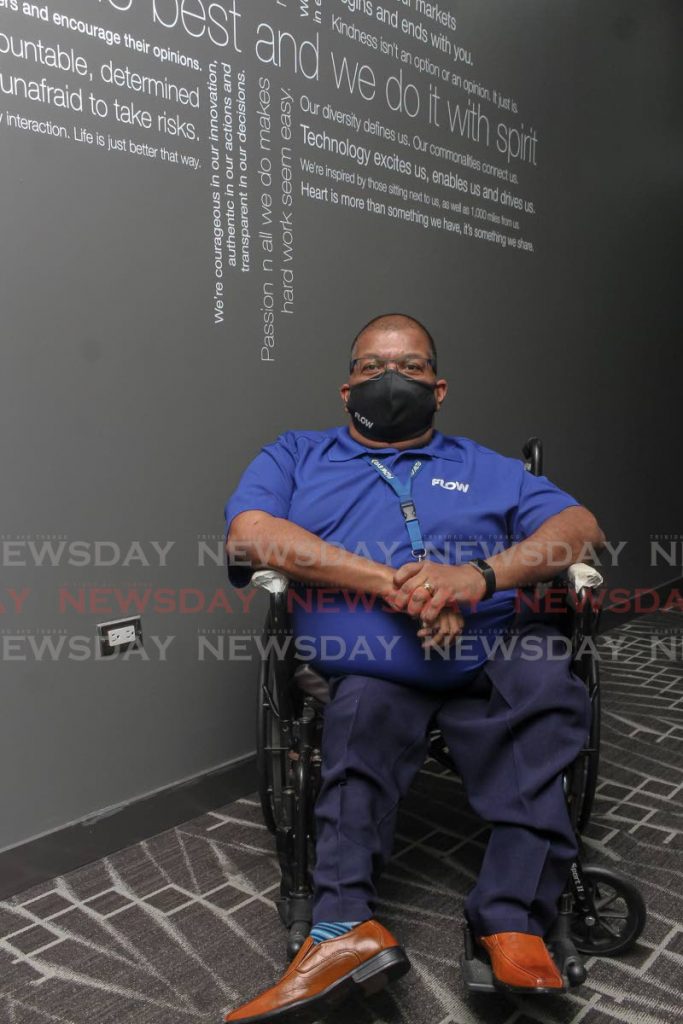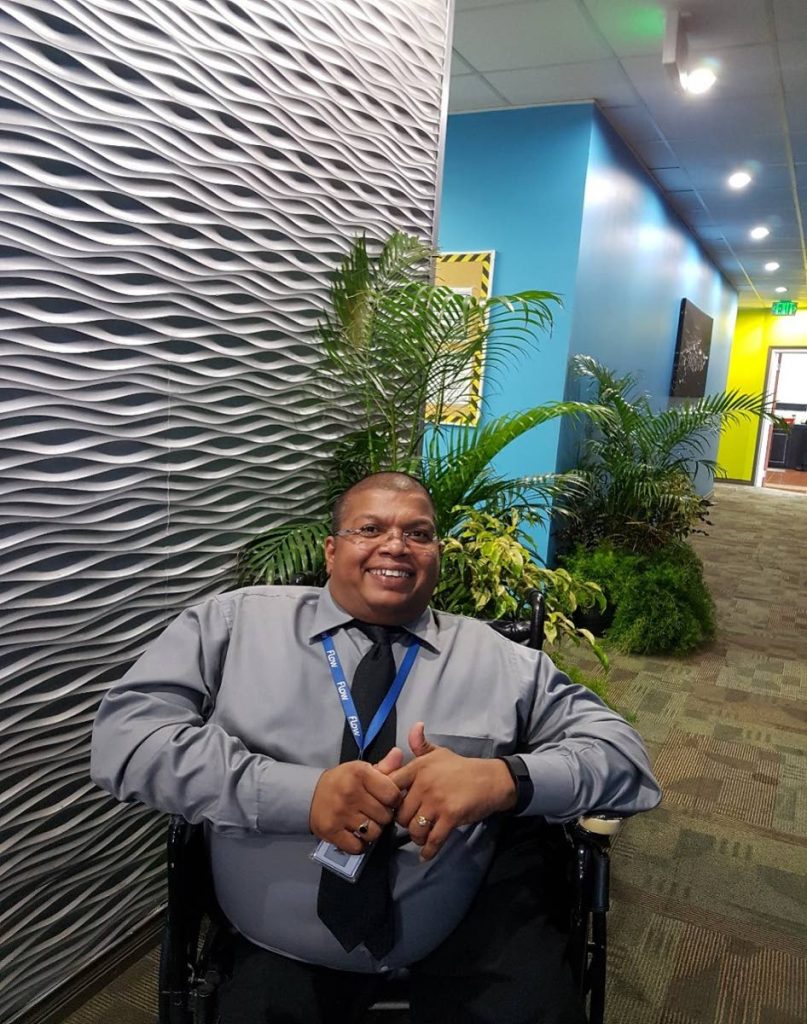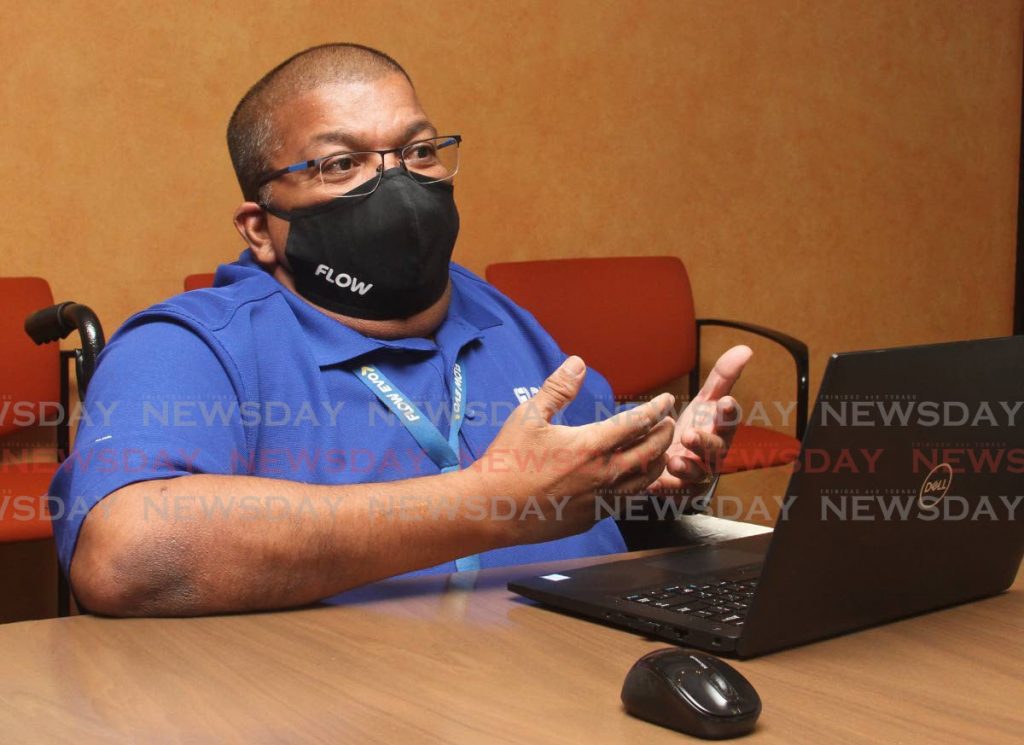Randolph Ramoutar finds purpose in life without use of his legs

There are characteristics of a great person which go beyond the physical – things that most successful people possess, that are not physical attributes. A good attitude, humility, determination and a willingness to work will trump physical prowess any day of the week.
In TT, as around the world, there is a community of people – the disabled – who in many cases share these same qualities, just like any able-bodied person. However, because of a stigma attached to those with disabilities, few in this community are given the opportunities to share the qualities they possess.
Randolph Ramoutar, the field audit manager of Flow, and a person who has lived without the use of his legs for almost his entire life, said although there have been strides in greater public awareness, he hopes more opportunities will be given to disabled people for them to contribute to society.
“Before, we were stereotyped,” he said. “If you have a disability, it is expected that you stay home. But I remember a friend telling me this – if you give someone with a disability a chance, they will work longer, harder and be more loyal to you than someone whom you would consider 'normal.' All we want is the opportunity.”
Ramoutar, 49, got that opportunity 21 years ago when he met someone who gave him a temporary job at what was then Trans Cable Ltd. But before that, he had to do everything he could to take care of himself, despite dire circumstances.
Born in El Dorado, he was diagnosed with polio when he was just nine months old. The disease took away his legs before he could even learn to use them. But his circumstances took away much more.
The first few years of his life were spent with his mother and father. But his home was an abusive one. His father, an alcoholic, would frequently abuse his mother. When he turned five, she took her own life.
“My mom, she couldn’t take it,” he said.
After her death, Ramoutar’s grandmother, Violet Boodoo, took him in. He would spend his primary school years between his grandmother’s home, also in El Dorado, and the Princess Elizabeth Centre in Woodbrook. During this time, he got a wheelchair. He also passed for Tunapuna Secondary School.
Ramoutar said his grandmother would arrange for him to be picked up and dropped off from school but soon he had to find his way to school on his own.

“Taxis couldn’t pick me up, maxis wouldn’t pick me up. Sometimes I would have to 'wheel' to school. From El Dorado to Tunapuna was about a mile or two. I would wheel down the Eastern Main Road, then go through the back road until I got to Green Street. It was hard, but it was good exercise.”
Mobility wasn’t his only challenge. Life at his home was difficult, with few people working, an alcoholic father, and a brother who had a dependency on drugs. Additionally, the school itself was not equipped to treat with students with disabilities.
He did not leave school with many passes and after his grandmother died there was very little finance coming into the house, but his determination and spirit would lead him not only to take care of himself but three younger siblings as well.
“I worked ten days, sold apples and oranges on the side of the road, I sold national lottery tickets. I would sit on the side of a grocery and I would share religious tracts, and people would give me money. We would have one meal for the day after I got that money and went to the grocery. That would take care of myself, my little brothers and my little sister for a while.
“It was something that I had to do. No one was working at the point in time. So if I didn’t get up and come out the house, I wasn’t going to eat,” he said.
It was outside the grocery that he met someone, whose name he did not mention, who gave him an opportunity to work at Trans Cable. For a two-week stint, he would help with filing for the company. The two weeks became three and eventually he became a permanent worker.
“Praise the Lord, it is 21 years later and I’m still here. During that time, I became a dispatcher, and after being a dispatcher, and the area that I am in was formed, I was asked to be in there as well. I became supervisor of that department in 2005. Then in 2010, I was promoted to manager of that team, and that is for the whole of TT.”
He said many people like him have similar stories, but first, they must get the opportunity to achieve. He believes more people are recognising their potential.
“I think TT, if I were to step back out – or in my case wheel back out – and look at it, it is slowly coming to a point where there is awareness. And not just to the point of people being sympathetic, it is people understanding the value of inclusion of disabled people in our society.”
“For example, parking spots. Before, that was prime parking space, now you see people leaving it for the disabled the more places you go to. Even when Flow was called Trans Cable, from the first day I went there they had ramps put in. They had the doors widened. There was a designated washroom for me. They ensured that infrastructurally I was taken care of. It set the tone for me here.”
But it wasn’t always this way. It took pioneers like George Daniel – chairman of the TT Chapter of Disabled People International, who in 2007 fought the state for the constitutional right of liberty – to raise awareness for disabled people. Daniel passed away in 2010.

One of Ramoutar's goals is to show disabled people that there are opportunities for them in TT. As a Flow employee, he helps people directly around him learn how to treat disabled people in the workplace. He said the two most important things to practise when dealing with disabled people are to allow them to try for themselves before offering help, and when offering, ask, “How can I help you?”
“Creating awareness in that way and helping people learn how to interact with people like myself is important to me. It is a fine line between offending the person and trying to help. Your intentions may be really good, but when it crosses the line to make me feel like I can’t do it, now I may not come out and say anything but how do I leave our interaction?
“I had someone come to me and they weren’t sure how to interact with people like myself, in terms of helping me and thinking that I could do stuff. Sometimes when I go to my car and I go to the driver’s side, people are like, 'Where is he going?' My wife would tell me every time I get in the car that I had an audience. And it feels good because it is showing that my disability is not limited to what you may think it is,” he said.
Flow management on Monday shared a circular in its offices celebrating Ramoutar and highlighting International Day for Disabled Persons, which is commemorated on December 3.
“This week we take a moment to celebrate the differently-abled among us. On December 3 we join the international community to recognise the international day of disabled people and pay homage to the people in that community who work with us,” the circular said.
Despite his hardships, despite his past, Ramoutar is living the best life he can, and is teaching those around him how to treat people like him with respect.

Comments
"Randolph Ramoutar finds purpose in life without use of his legs"